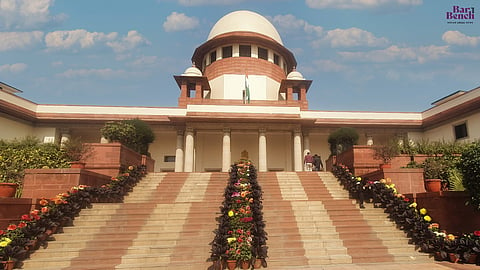
- Latest Legal News
- News
- Dealstreet
- Viewpoint
- Columns
- Interviews
- Law School
- Legal Jobs
- हिंदी
- ಕನ್ನಡ

The Supreme Court on Tuesday held that High Courts while deciding applications under Section 482 of Code of Criminal Procedure (CrPC) for quashing of case at the stage of framing of charge, should not enter into appreciation of the evidence or consider whether on the basis of such evidence the accused is likely to be convicted or not (Saranya v. Bharathi).
While exercising inherent powers under Section 482 CrPC, the High Court is not conducting trial or exercise appellate jurisdiction against an order of conviction or acquittal, a Bench of Justices DY Chandrachud and MR Shah held.
It, therefore, set aside a decision of the Madras High Court which had in exercise of Section 482 powers quashed charges against a person who was a co-accused in the murder of a Tamil Nadu man.
"The High Court has entered into the appreciation of the evidence and considered whether on the basis of the evidence, the accused is likely to be convicted or not, which as such is not permissible at all at this stage while considering the application under Section 482 Cr.P.C. The High Court was not as such conducting the trial and/or was not exercising the jurisdiction as an appellate court against the order of conviction or acquittal," the Supreme Court ruled.
Therefore, in the facts and circumstances of the case, the High Court ought not to have quashed the chargesheet against the respondent, the Court held.
As per the complaint given by the wife of the deceased, her husband was unemployed at the relevant time when one Vela alias Velayutham was introduced by respondent-accused Bharathi to them. Bharathi told them that Velayutham was employed at Guindy Employment Exchange and that if they give money, he can arrange government employment for them.
They believed the same and gave ₹4 lakh to Velayutham. On September 23, 2019, Velayutham told them that he will get the appointment order that very day and asked the two of them to come to Vyasarpadi.
As instructed, they met Velayutham at a flat in Vyasarpadi where he offered them a powder claiming it to be ‘Prasadam’ from Shirdi Sai Baba Temple.
Since the powder was bitter in taste, the complainant spat it out but her husband had consumed it after which he fainted and fell down.
He was rushed to the hospital but had breathed his last by then.
In the case registered based on the wife's complaint, Velayutham was made the prime accused while Bharathi, who had introduced them to Velayathum was charged for offences under Sections 420 (assembling for purpose of committing dacoity) 302 (murder) read Section 109 (abetment of any offence) of Indian Penal Code (IPC).
The case was pending for committal before the Metropolitan Magistrate, Egmore, Chennai when the respondent approached the High Court under Section 482 for quashing the entire chargesheet against her.
The High Court allowed the plea leading to the present appeal before the top court by the wife of the deceased.
The Supreme Court in its judgment referred to various decisions on the issue.
In this regard, specific reliance was placed on State of Madhya Pradesh v. Deepak [(2019) 13 SCC 62] in which it was held that at the stage of framing of charges, the court has to consider the material only with a view to find out if there is a ground for “presuming” that the accused had committed the offence.
"It was held (in Depak case) that at that stage, the High Court is required to evaluate the material and documents on record with a view to finding out if the facts emerging therefrom, take at their face value, disclose the existence of all the ingredients constituting the alleged offence or offences. It is further observed and held that at this stage the High Court is not required to appreciate the evidence on record and consider the allegations on merits and to find out on the basis of the evidence recorded the accused chargesheeted or against whom the charge is framed is likely to be convicted or not," the Court said.
In the present case, there is sufficient material on record raising strong suspicion against respondent, the top court opined.
"It has been found that she was serving in the Secretariat and was in touch with the deceased and the complainant as she used to go to Xerox shop owned by the deceased and she introduced accused 1 to the complainant and the deceased. It is specifically alleged that she said that she can manage to get the job/employment for the deceased but for that they have to pay," the Court noted.
Further, a recovery of ₹1.2 lakh was made from the house of the respondent based on her own confessional statement.
"It also appears that during the course of the investigation, the investigating officer has collected very important evidence in the form of call details between accused 1 and accused 2 (respondent) which are in the proximity of the time of commission of offence and even thereafter," the judgment said.
Therefore, in the facts and circumstances of the case, when respondent had been chargesheeted for the offences under Sections 420, 302 r/w 109 IPC and when there was ample material to show at least a prima facie case against respondent, the High Court committed a grave error in quashing the chargesheet/entire criminal proceedings against Bharathi in exercise of powers under Section 482, the Supreme Court concluded.
The High Court evidently ignored what emerged during the course of investigation and entered into appreciation of evidence, the apex court said while quashing the High Court verdict and directing the Magistrate to proceed with the case.
[Read Judgment]